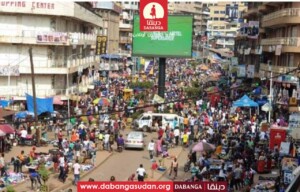Sudan fuel shortage slows humanitarian aid: UN agencies
(UPDATE 17:45) The ongoing fuel shortages in Sudan are slowing down humanitarian operations. The UN Refugee Agency (UNHCR) reported in its latest update on South Sudanese refugee response that the fuel crisis in Sudan worsened at the end of March, affecting response logistics.
 UNHCR convoy passes Sudanese man riding on a camel in Um Shalaya refugee camp near El Geneina, Darfur. (UNHCR file photo)
UNHCR convoy passes Sudanese man riding on a camel in Um Shalaya refugee camp near El Geneina, Darfur. (UNHCR file photo)
The ongoing nationwide fuel shortages in Sudan are slowing down humanitarian operations. The UN Refugee Agency (UNHCR) reported in its latest update on South Sudanese refugee response that the fuel shortages across Sudan worsened at the end of March, affecting response logistics.
UNHCR said that while some relief has been provided with renewed availability of fuel supplies, it anticipates on additional shortages in the coming months, said the Office for the Coordination of Humanitarian Affairs (OCHA) in its latest news bulletin.
In South Kordofan, some international NGOs are not able to access their pre-positioned fuel stocks stored at fuelling stations in the State capital, Kadugli. They are only allowed to receive a limited amount of fuel, not considered enough for their operations. The UN has requested from the Humanitarian Aid Commission (HAC) in South Kordofan to facilitate INGOs’ access to fuel stocks.
As for UN agencies, the UN Interim Security Force for Abyei (UNISFA) has agreed to supply fuel to all UN agencies based in South Kordofan.
In addition the lack of diesel for generators and water pumps will impact the cold chain for vaccines and could lead to shortages of water for drinking, livestock and agriculture, which will eventually impact food security. The UN Food and Agriculture Organization (FAO) confirmed this in its Early Warning Early Action report on food security and agriculture for April-June 2018, and that the situation threatens the 2018/2019 agricultural season.
Expensive transport: expensive food
In its latest update Famine Early Warning System Network (Fews Net) reports that fuel shortages across most parts of Sudan worsened towards the end of March, beginning of April. This coincided with the high inflation and local currency depreciation following macro-economic changes in Sudan’s new annual budget.
This has led to high transportation costs, which in turn resulted in high prices of food and non-food items across different parts of the country.
Speaking to Radio Dabanga yesterday, Dr Hasan Bashir, economist at El Nilein University in Khartoum, said that the rise of the exchange rate of the US Dollar has led to a rise of production costs in Sudan. “It has aggravated the cyclical inflation and prices, as well as the deterioration of purchasing power which the Sudanese Pound holds.”

North Kordofan
On Thursday residents in El Obeid, the capital of North Kordofan, reported a new rise in the prices of tickets for local transportation: from three Pounds to ten Pounds. The city is still lacking diesel.
“We have to use the rickshaw instead of the buses, because buses have stopped operating,” a resident explained. “Now the price for a rickshaw ticket has gone up to to SDG10 per passenger.”
In addition El Obeid electricity distribution centres in several districts have shut down to be confined into one centre.
“Three days ago the electricity department shut down all electricity distribution centres in the city and kept one centre in operation. This resulted in people standing in long lines to buy their electricity,” another listener of Radio Dabanga said.
The closure of the electricity centres came after the announcement by the city's water administration office, that the water service bills will be connected to electricity bills starting May.












 and then
and then